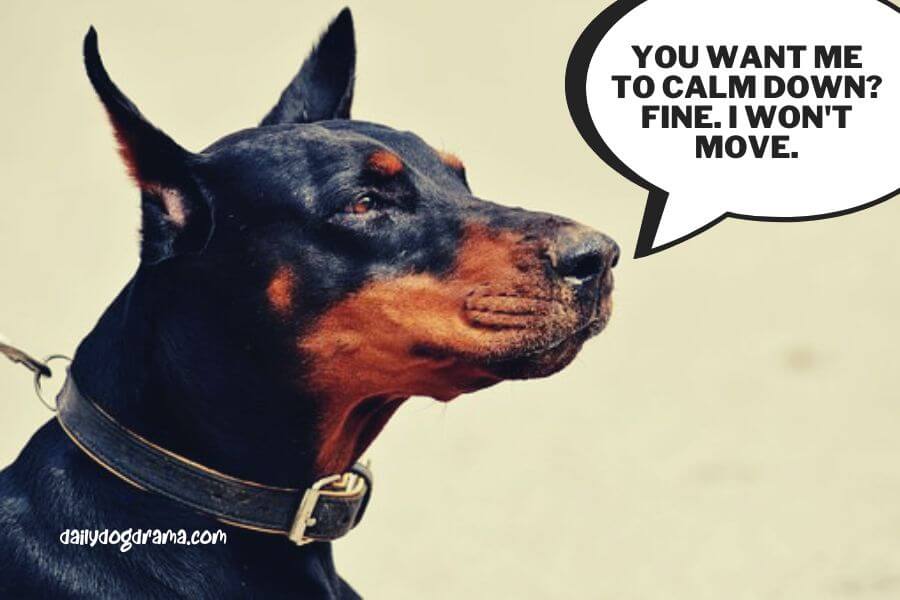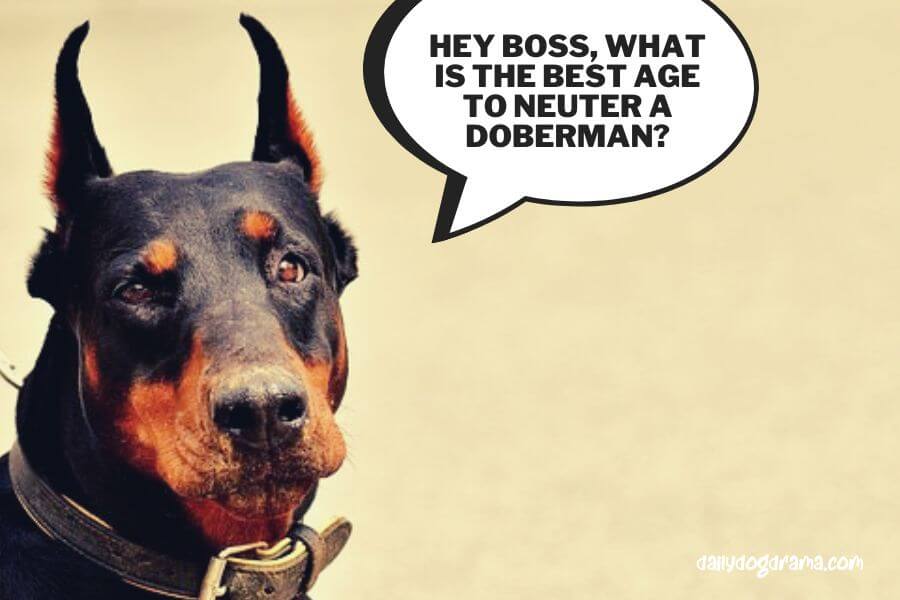Do you know what DOG ESSENTIALS you are missing out? Find out now!
Zack Keithy, our author, is a certified veterinarian technician (UC Blue Ash) for over 6 years (contact him here). The articles written here are based on his expertise and experience, combined with a review by our expert vet reviewers including Dr M. Tarantino. Learn more about us here.
If you’re thinking about neutering your doberman pinscher, it’s a big decision.
The pros are obvious: your dog won’t have unwanted puppies and can focus on being the best canine companion it can be. But there are some risks involved too, as there might be post-op complications such as infections.
And after the operation, there are certain things you need to know how to care for your dog so that it stays healthy and happy.
In this post, I will share all the pros and cons of neutering a Doberman Pinscher, a few tips on how to care for them after the fact, and hopefully provide you with enough information to make the right choice for you and your dog.
Medical Questions? Talk to a Veterinarian 24/7.
Connect one-on-one with a licensed vet who will answer your questions in minutes.
*Article may contain affiliate links to retailers like Amazon and Chewy. Learn more on our disclosure page.

- What Happens During Neutering?
- Why Are Dogs Neutered?
- Are Doberman Pinschers Calmer After Being Neutered?
- Advantages of Neutering a Doberman Pinschers
- Disadvantages of Neutering a Doberman Pinscher
- Neutering Age for Dogs
- The Risks Involved in Neutering Your Doberman
- Care and Recovery After Neutering Your Dog
- Is It Better to Neuter a Doberman Pinscher?
- In Conclusion: Pros and Cons of Neutering a Doberman Pinscher
What Happens During Neutering?
Neutering is the surgical removal of a male animal’s testicles which stops sperm production and have these glands stop producing hormones.
This is carried out to enhance dog behavior and prevent reproduction.
Commonly, the operation is recommended to be done as early as 8 weeks of age but a study have shown that this is not entirely the case.
It looks at different breeds and analyzed how neutering or spaying affects them later on in life.
In general, testicular removal can guard against various health issues that may arise in later life, such as testicular cancer, but also comes with certain risks too.
This is why it is so important for a dog owner to understand the pros and cons before making a decision.
Doggy says, you might like this too: Pigeon Chest French Bulldog: How to Deal With It?
Why Are Dogs Neutered?
Although your dog’s health and safety are the main reasons to neuter it, there are many other reasons that contributes to making this decision too.
Neutering a dog can significantly lower its risk of developing testicular cancer and prostate problems.
Additionally, it aids in the correction of sexually frustrated-related problems in dogs, such as mounting and humping.
In fact, if they haven’t been castrated, around 70% of male dogs are thought to behave violently toward humans or other dogs.
Additionally, neutered dogs are less prone to stray, which lowers their risk of being stolen or lost, or of getting into harmful situations with other animals (whether wild or domestic).
Doggy says, you might like this too:How to Keep a Dog Beard From Smelling? [5 Ways That Work]
Are Doberman Pinschers Calmer After Being Neutered?

If you neuter your dog, his personality and intelligence won’t change.
Many believe that their dogs will become ‘calmer’ after sterilization but this is a myth that needs to stop.
What happens instead is that their testosterone levels will drop, which leads to changes in certain behaviors.
Your dog will continue to be energetic, but it will shed undesirable actions such as mounting and humping, marking its territories, and be less prone to wander off.
We discuss more about the advantages and disadvantages in the next sections.
Doggy says, consider reading this too: Should I Buy a Puppy With an Umbilical Hernia?
Advantages of Neutering a Doberman Pinschers
Although neutering your dog may seem cruel, try not to think that way.
Many consider this to be responsible dog ownership, and if there is no intention to breed your dog, neutering it should be a necessity.
There are several advantages, and most of them are health-related.
They can be summarized as follows:
- Increase in dog’s lifespan
- Lowers risk of developing UTI
- Prevent testicular cancer
- Less likely to fight for territory and mark them
- No unwanted pregnancies
- Less aggressive
According to a study, neutering dogs extended their life expectancy.
The findings reveal that dogs have an average longer lifespan of 13.8% for males and 26.3% for females.
Sterilization removes the organs completely, which means that neutered dogs are less likely to acquire testicular and prostate cancer, in which the risks increase greatly past 10 years old.
The likelihood that your dog may get an uncomfortable and painful urinary tract infection is also decreased by neutering him.
A neutered dog is less likely to challenge other male dogs while seeking to mate with female canines that are in heat, battle over territory, and roam and challenge them.
This reduces the risk of contracting contagious diseases like canine herpes, which spread quickly during the mating season.
Dogs who have been fixed also have less of a desire to mark their territory, so they are less likely to purposefully urinate within the home and create a mess.
You won’t experience any unwanted pregnancies because they no longer have a strong urge to mate (and are actually incapable of impregnating females).
Last but not least, as they mature, your Doberman Pinscher will become less aggressive, less prone to bite, and very unlikely to exhibit bad behaviors like humping.
Doggy says, you might like this too: Dog Can’t Open Eyes After Grooming [What To Do Now?]
Disadvantages of Neutering a Doberman Pinscher
Before making a final decision, you should carefully weigh the disadvantages of neutering your Doberman Pinscher too.
They can be summarized as follows:
- Risk of developing joint problems
- Change in behavior is not guaranteed
- Might experience a change in coat’s texture
- Inability to breed your dog anymore
The first is that there is an increased chance that your dog will develop a joint condition after being neutered.
According to a study published in Frontiers, “in the three categories of dogs weighing 20 kg or more, neutering before 1 year generally was significantly associated with risks of one or more joint disorders above that of dogs left intact”.
This frequently occurs in large breed dogs when they are neutered too young (before to the age of one year).
Hip dysplasia, elbow dysplasia, and cranial cruciate ligament injuries are examples of common joint issues they face.
Next, a change in behavior is not always assured after neutering your Doberman Pinscher, which can be seen as a drawback for some owners.
In some cases, some dogs actually become more aggressive, but this is more of an anomaly than the rule.
Thirdly, some dog owners have mentioned that their dog’s coat texture changed after being corrected as a result of hormonal changes.
However, this condition is actually very rare, expect for in spaniel breeds just like the Cocker Spaniel, where it seems their coat tends to become fluffier.
Last but not least, you won’t be able to breed your dog, which may be an important consideration for some owners.
If your dog is fixed, for instance, you won’t be able to breed it with another purebred in order to maintain the lineage of your purebred Doberman.
Doggy says, you might like this too: Chlorophyll for Dogs in Heat [Mask Smell?]
Neutering Age for Dogs

Best age to neuter a male Doberman Pinscher
Most veterinarians will advise neutering a Doberman between the ages of 6 and 12 months as they have not reached sexual maturity and can be easily trained to be housebroken.
In fact, this also becomes commonly regurgitated around the internet on articles which is not that accurate.
A study discovered that this not always the case and should be looked at on a breed to breed basis.
It is advised to wait until your Doberman is at least 1 year old before having it neutered due to the increased risk of of cancers.
The actual procedure only takes around 30 minutes, and when done correctly, your dog won’t feel any pain or discomfort for the rest of its life.
I would advise you to find a vet that has lots of experience in this area so that your dog gets the best care and treatment.
Recommendations from friends and reviews online will help you out.
Doggy says, consider reading this next: Dog Anal Gland Removal Pros and Cons
The Risks Involved in Neutering Your Doberman
Although neutering your dog is a very common procedure and is thought to be quite low risk, that does not mean there is absolutely no risk.
An infection is the most frequent issue that might arise after a neuter procedure, but this is readily resolved with medication.
Additionally, there’s a potential that your dog will get an abscess near the incision or near his testicles.
Please get in touch with your veterinarian right away if you detect any odd swelling or discharge coming from this area so they can take the necessary action.
The next section will give you some tips on how best to care for your dog after the operation.
Care and Recovery After Neutering Your Dog
Most dogs will take about 2 weeks to fully recover from being neutered, although some may take a bit longer than that.
During this time, it’s important to pay attention to your dog’s health and keep an eye out for any unusual symptoms or changes.
When your dog is neutered, he’ll need plenty of fluids and rest.
You should also be aware of some weird behavior like constantly sitting after being neutered, or if you have a female dog that has been spayed, watch out for it trying to scratch its spay incision with its hind legs.
Make sure you are providing him with plenty of water after the surgery, and don’t be afraid to give him a few extra naps if he seems tired.
Most veterinarians will recommend giving your dog a painkiller after the surgery, and you should also be careful that he doesn’t jump or play vigorously during this recovery period.
Is It Better to Neuter a Doberman Pinscher?
Ultimately, as a dog owner, it is up to you to make that choice.
It goes without saying that if you plan to breed your Doberman, this is not an option.
Both sides will have a valid point of contention in this never-ending discussion.
As the dog’s owner, you must take a position and act in the dog’s best interests.
Do as much research as you need to while attempting to keep emotions out of the conversation.
Doggy says, you might be interested in this too: Should you neuter an Australian Shepherd?
In Conclusion: Pros and Cons of Neutering a Doberman Pinscher
You may have to make a difficult decision to neuter your dog, but if you do, stick with it.
Make sure you are neutering your dog for the right reasons by weighing the advantages and disadvantages of the process before deciding whether to go through with it.
Get prepared for the procedure, get informed of all the risks, and shower your dog with lots of love when it returns home if you’ve decided that having your dog neutered is the best course of action.
Check out other dog care articles such as dog conjoined paw pads, why is my puppy such a light sleeper, can puppies hold their pee all night, and many more!
You’ve made it to the end, but I hope it’s not the end of our journey. We want to hear your voice! Share your thoughts, problems, suggestions, or anything related to your dog in the comments section. And don’t forget to join our newsletter today too.




